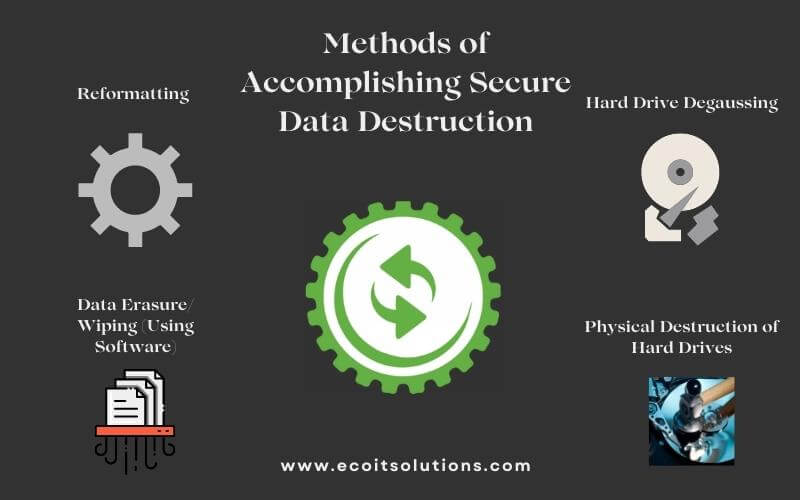Ideal Practices for Data Destruction to Strengthen Your Cyber Security Structure
Ideal Practices for Data Destruction to Strengthen Your Cyber Security Structure
Blog Article
The Important Nature of Information Devastation in Upholding Computer System Safety Providers and Protecting Versus Unauthorized Access
In an era where information violations and identity theft are progressively widespread, the importance of effective data damage can not be overemphasized. Various approaches, from information cleaning to physical devastation, offer as critical safeguards versus unapproved gain access to.
Relevance of Data Devastation
In a progressively electronic globe, the importance of data devastation can not be overstated. As companies amass huge quantities of delicate info, the possible consequences of stopping working to properly get rid of and manage of that information come to be increasingly serious. Data violations, identity burglary, and corporate espionage position considerable hazards, emphasizing the requirement of effective data damage techniques.

Furthermore, as technology develops, so too do the approaches through which harmful actors look for to make use of delicate details. Organizations should stay proactive and cautious in their data damage approaches to secure versus these developing dangers. By prioritizing data devastation, firms not only safeguard their properties however additionally foster count on among stakeholders and clients, showing a dedication to responsible information monitoring and safety techniques.
Methods of Effective Information Devastation
To make certain the irreparable and full devastation of delicate data, organizations can employ a range of efficient techniques tailored to their particular requirements. Among one of the most usual approaches is data wiping, which includes utilizing specialized software to overwrite existing information numerous times, making recuperation basically impossible. This is especially helpful for solid-state drives and tough drives, where conventional deletion methods are insufficient.
An additional effective approach is degaussing, which utilizes strong magnetic areas to interfere with the magnetic domains on storage media, providing the information irretrievable. This approach is especially fit for magnetic storage space devices, such as tape drives and hard drives.
Physical devastation is likewise a feasible alternative, involving the shredding, squashing, or incineration of storage space devices. This method guarantees that information can not be recouped, making it suitable for organizations managing extremely sensitive information.

Conformity With Information Protection Laws
Organizations have to not only concentrate on reliable data damage approaches yet additionally make sure compliance with information security regulations that regulate exactly how delicate details is dealt with and gotten rid of. Abiding by these laws is vital for preserving and guarding individual data customer depend on. Rules such as the General Information Defense Regulation (GDPR) in the European Union and the Health And Wellness Insurance Policy Portability and Accountability Act (HIPAA) in the United States impose stringent guidelines on data administration, that include requirements for the secure disposal of sensitive details.
To achieve compliance, organizations should execute comprehensive information destruction plans that line up with these lawful structures. This consists of recognizing data that requires damage, establishing protocols for safe and secure methodsâEUR" such as shredding physical media or utilizing software that satisfies sector requirements for information wipingâEUR" and maintaining comprehensive documents of destruction tasks. Normal audits must be performed to ensure adherence to these policies and to recognize any type of prospective locations for improvement.
Failing to adhere to data protection guidelines can cause substantial legal ramifications, consisting of large fines and damage to a company's online reputation. Incorporating compliance right into information devastation techniques is not just a lawful responsibility yet additionally an important component of a durable details safety approach.
Effects of Poor Information Handling
Poor information handling can lead to serious effects that expand past instant functional troubles. Organizations might encounter considerable monetary losses because of data breaches, which commonly cause expensive removal efforts, legal costs, and regulatory fines. These economic implications can prevent and stress sources growth, ultimately impacting a company's bottom line.
Furthermore, poor information handling can severely damage a company's online reputation. Clients, stakeholders, and partners may shed count on an entity that fails to safeguard delicate info, bring about reduced customer loyalty and possible loss of company chances. This disintegration of count on can take years to restore, if it can be recovered in any way.
Additionally, organizations might deal with lawful ramifications arising from non-compliance with information protection guidelines. Such offenses might lead to investigations and fines, worsening the monetary problem and further staining the organization's image.
In the world of cybersecurity, poor information management practices can create susceptabilities that make systems extra prone to unauthorized access and cyberattacks. Ultimately, these effects highlight the important significance of executing durable data handling procedures to guard sensitive info and keep business stability.
Ideal Practices for Secure Information Disposal


To start with, data need to be classified according to its level of sensitivity. Sensitive details needs a lot more click here to read strenuous disposal approaches, such as shredding physical records and utilizing innovative software program for electronic information wiping. Utilizing qualified information damage solutions guarantees conformity with industry regulations and criteria.
Secondly, companies ought to execute an information disposal policy that mandates normal audits. This policy ought to outline the treatments for information retention and damage, making certain that obsolete information is disposed of without delay and safely. Training employees on these methods is important to promoting a culture of safety recognition.
Finally, preserving detailed documents of disposed information boosts liability and provides a clear audit trail. This documentation must consist of the sort of data destroyed, the technique made use of, and the day of disposal.
Final Thought
In conclusion, the imperative of efficient information destruction is evident in its role in enhancing computer system safety services and reducing unauthorized accessibility dangers. Taking on durable methods such as data wiping, degaussing, and physical destruction, together with conformity with policies like GDPR and HIPAA, is necessary for safeguarding delicate information. Neglecting appropriate data disposal methods can bring about serious effects, consisting of information breaches and legal effects. Executing ideal methods in safe and secure information disposal ultimately strengthens organizational stability and customer count on.
In an age where information breaches and identification theft are progressively widespread, the importance of effective data destruction can not be overstated. data destruction. Data violations, identification theft, and business espionage posture substantial risks, highlighting the need of effective information destruction techniques
Compliance with regulations such as GDPR and HIPAA requireds that companies execute rigid information defense procedures, including the secure devastation of data at the end of its lifecycle.
By focusing on information destruction, view publisher site firms not only secure their possessions yet also foster depend on amongst stakeholders and customers, showing you could try this out a commitment to liable data monitoring and safety methods.
Organizations need to not just focus on reliable data damage methods but likewise ensure conformity with data defense regulations that regulate how delicate info is taken care of and disposed of.
Report this page